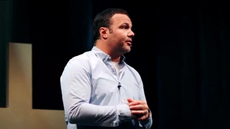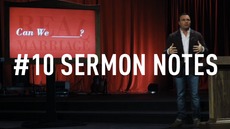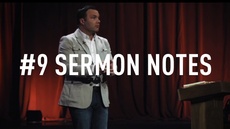From the April 29 sermon “Fundamentalist in Ephesus: All Head, No Heart,” preached by Pastor Mark Driscoll out of Revelation 2:1-7:
Pastor Mark preaches on Jesus’ letter to the church in Ephesus from the ancient city of Ephesus itself. Jesus commends the Ephesians for how they serve faithfully, endure hardship, have sound doctrine, and hate heretics, but his big criticism is that they are not very loving. Instead of merely criticizing the Ephesians, we must read Jesus’ words humbly and realize how we could become like them.
When It’s Hard to Love People
And [Jesus’] big criticism is this: “You’re not very loving.” Now, he’s commended them for hating wolves, but he’s criticizing them for not loving shepherds and sheep and not loving himself, the good shepherd. [. . .]
In our day, this is just classic fundamentalism. You know, “We’re Bible believing.” Okay, but are you nice? Because the Bible says “love,” a lot. “Well, we speak the truth.” But do you speak the truth in love? Because the Bible says that we are to speak the truth in love.
And what could happen for those who are like the Ephesians, it’s truth and works and perseverance, but not love and grace and kindness. And so it becomes heavy handed, authoritarian, a little bit cold.
We Can’t Pit Truth against Love
Number one, I think we can become like the Ephesians if we pit truth and love against one another. Right? Jesus came full of grace and truth. Some people are grace people. Some people are truth people. And here Jesus is saying, “I want you to put truth, wrapped in grace. I want there to be love around the truth.” [. . .]
So what we don’t want to do is pit love or grace and truth against one another. We want to say that the truth must be communicated from someone who is loving. But what can happen is we could become like the Ephesians when we elevate the truth, and we devalue love, or we devalue love for non-Christians, or other religions, or people who annoy us, people who oppose us, people who criticize us, people who mock us.
Jesus says, basically, we need to say the right thing, at the right time, in the right way, with the right motives. Truth, yes, with the airbag of love; otherwise, we’re just going to decimate people.
Don’t Elevate Doctrine above the Holy Spirit
Number two, we could become like the Ephesians when we listen only to our doctrines and stop listening to the Holy Spirit. What can happen is you read the Bible so long and so many books, and you’re under so much teaching and education that all of a sudden you’ve got most of your questions answered, and you’ve got all your verses in categories, and all your systemization is essentially completed, or at least functionally operative, and then all of a sudden, you don’t need to pray much anymore, because you have a theology that tells you what to do. You don’t need to listen to the Holy Spirit anymore, because you have a theology that directs all of your steps.
I’m not saying that we avoid our doctrinal distinctives and our theological clarity, but we still need to be filled with the Holy Spirit. We still need to be led by the Holy Spirit. We still need to listen to the Holy Spirit, and we need to remain teachable. And that’s why one of the things that he says to each of the seven churches is, “He who has an ear, let him hear what the Spirit has to say to the churches.” What he’s saying is, “You’re not listening to the Holy Spirit.” [. . .]
We need him every moment of every day, and every Christian always has. We need him to lead us and guide us, convict us and instruct us.
And one of the ways we can become like the Ephesians is we get so consumed with our studies and our systematics, that we forget that Jesus is alive, and we’re supposed to have a relationship with him, and the Holy Spirit dwells in us, and we’re supposed to follow him.














